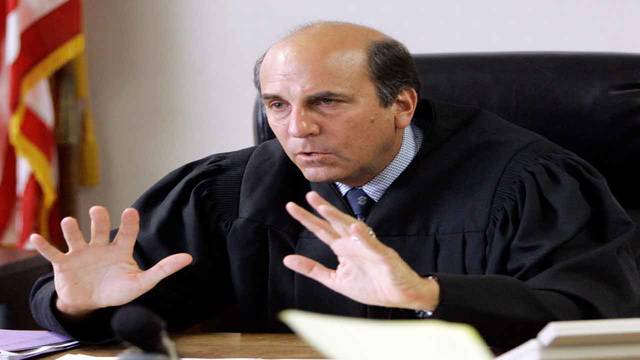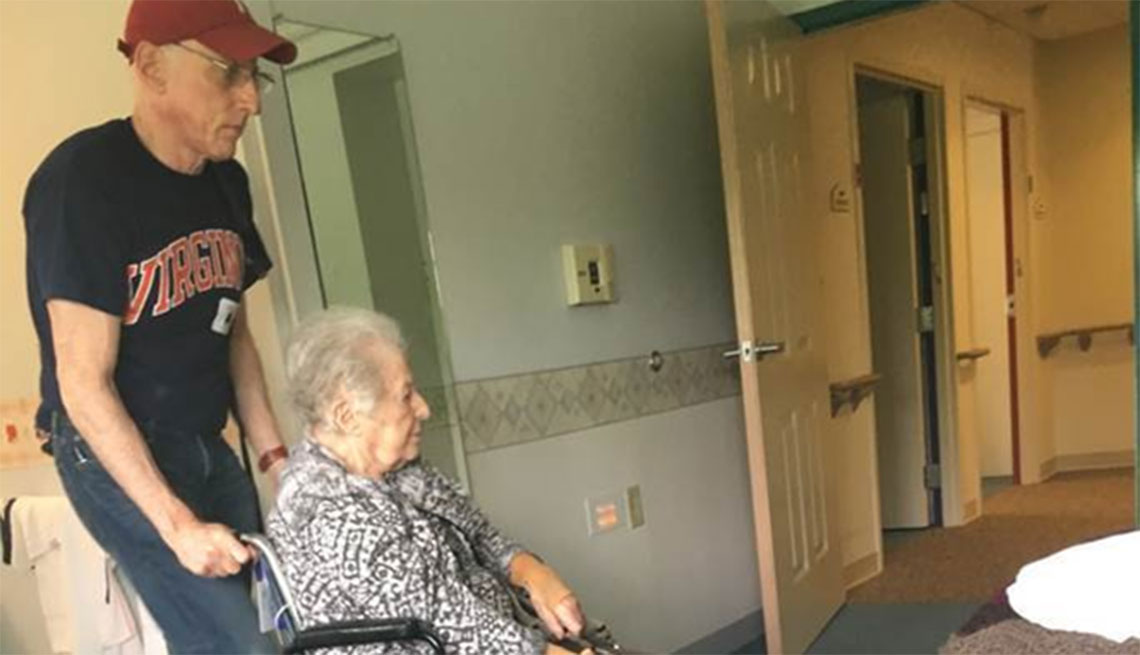After her death and burial, custody battle continues for her 5-month-old child
By Michelle F. Solomon - Podcast Producer/Reporter
Finally, Anna Nicole Smith is buried in Nassau, Bahamas, next to her
son, Daniel. She has the ashes of dearly beloved billionaire husband J.
Howard Marshall with her.
But there's still no rest in peace. Activity in the Smith saga
continues in Nassau. Just 20 minutes from Lakeview Memorial Gardens
& Mausoleum, and since her burial on March 2, 2007, the Supreme
Court of the Bahamas is hearing from all sides fighting over Dannielynn,
Smith's 5-month-old daughter.
It's about two weeks after Smith's burial.
Larry Birkhead, one of the men claiming to be Dannielynn's father, comes
out of the Supreme Court building in Nassau looking upbeat. He doesn't
have any news he can share but tells the media that the legal battle
should soon be over.
"I've been putting a nursery together, so I'm smiling," he says.
Someone who isn't smiling is Smith's mother,
Virgie Arthur. She wants custody of Dannielynn, saying she could
provide a more stable home than Howard K. Stern.
DNA from the baby was obtained on March 21, 2007. A judge could have
ordered a DNA test from Stern, but it was determined that he did not
have to submit to the test because, under Bahamian law, it is already
presumed he is the father of the baby because his name is listed on the
birth certificate.
But Bahamian attorney Godfrey Pinder says that the birth certificate is far from proof.
"The birth certificate is defective," he
says. "The area where 'informant' is, well, there is an attorney's name
and it should be his name. According to
section 12, the Registration Births and Deaths, Chapter 188,
only certain people can give that kind of information -- the father,
the mother, a person who was present or the nanny. The lawyer cannot
sign it. You can do it California, but you can't do it in the Bahamas.
It makes it defective. It makes it voidable. Right now, it makes (the
birth certificate) not good."
Pinder is the lawyer representing developer
G. Ben Thompson, who is battling, too, in Nassau Supreme Court to take
control of the Horizons estate on Eastern Road where Stern and
Dannielynn are living. Pinder says Thompson bought the house and
Thompson's lawyers had drawn up papers for it in Smith's name because,
although he was in possession of the house, he wanted her to purchase
the house eventually. Now Thompson's lawyers are claiming that since
Smith has died, Stern is trespassing on the plaintiff's property. And he
needs to go.
When the press asks what will happen to Dannielynn, he says, "Dannielynn is basically a ward of the Bahamas, so to speak.
But nothing is going to happen to her," he promises. "We love our babies."
DNA from Smith's body was obtained when she
was at the Broward County medical examiner's office. Birkhead has
submitted his DNA, as has another man who claims he could be the father
-- Zsa Zsa Gabor's husband, Prince Frederic von Anhalt, who says that he
had a decade-long affair with Smith.
Back in Broward County
The Smith saga hasn't exactly left Broward County either. Broward
County medical examiner Dr. Joshua Perper has yet to announce,
officially, what exactly caused Smith's death. Seminole police continue
to investigate.
In Perper's comprehensive 84-page report
from March 2007, he states that forensic examination of two of Smith's
computers "confirmed intense grieving over Daniel's death but showed
that her mood had improved, she was generally enjoying life, and that
she was planning on having another child." These conclusions were dated
the weeks of March 10-23.
On this same page, it says the investigation and final reports are complete.
On Monday, March 26, 2007, Perper and the
Seminole Police Department hold a press conference to officially
announce the findings. Outside of the ME's office, Perper speaks, saying
the former Playboy Playmate didn't "suffer. She went to sleep." He said
that all of the drugs in Smith's system were prescribed to her,
including three different drugs for anxiety and three for depression.
Only one of the drugs was found at toxic levels, chloral hydrate, a
sedative used to treat insomnia. Perper said that alone would not have
killed her, but it was the effect of the drugs combined.
"Therefore, the cause of death is combined drug intoxication, with
chloral hydrate being the major component and the other drugs being
contributing," Perper tells the media. "Basically, what happens is that
those drugs act on the respiration and the circulation centers in the
brain and it shuts them off."
The announcement came seven weeks after her death at the Seminole Hard Rock Hotel & Casino in Hollywood.
Seminole Police Chief Charlie Tiger put to rest theories of anything other than a drug overdose.
"We are convinced, based on the extensive
review of the evidence, that this case is an accidental overdose with no
other criminal elements present," Tiger says. "Today's release by Dr.
Perper of the cause of death effectively closes the case. We found
nothing to indicate any foul play."
Judge Seidlin writes a book
In 2010, Judge Larry Seidlin, the Broward County judge who presided
over the battle to bury Smith, writes and publishes a book. Its title:
"The Killing of Anna Nicole Smith."
"Being so deeply troubled by the outcome of
these matters in my case, we decided, my wife and I decided, that I
would write a book," Seidlin tells me. "She was very helpful, and we
spent the next few years investigating and researching all of these
issues. When we finished, we looked at each other and we said we could
write another because there are many issues that are unanswered. There
are red flags flying."
His job presiding over the battle to bury Smith,
he says, became about two things: "Where Anna Nicole should be buried,
that was my primary job, and secondly, I made sure that this DNA was
done. That we need to find the father for this little girl who has no
mother. And that was done. And the foul play? That had to be proven by
law enforcement. I could only take the horse to certain water. I
couldn't do everything. I was done with the case after six days. You
wanna be chasing windmills? I did the best I could do in researching
this and investigating this and I still feel it doesn't add up. But I
have nothing that puts A equaling B. I have nothing that directly brings
it all together. I have my feelings based upon what evidence there was.
There are questions that still need to be answered."
Most everyone I've spoken with both on and
off the record, besides Seidlin, is satisfied with the conclusion that
both Smith's and Daniel's deaths were caused by accidental overdoses --
that Daniel had a drug problem and that, after his death, Smith had lost
her will to live and had a history of prescription drug use and
overuse.
Will Seidlin continue on his quest to prove what he believes is an unsolved case?
"If you're asking me if I'm going to get
back on my white horse and start to ride again, I don't have the power
and the influence to get anything going more than what I did," Seidlin
says. "I quote the great poet who says, 'You go to your grave with a
story still be told.' I've told my story. I'm not going to be
frustrated. I told my story the way I see it."
Birkhead says that what he remembers during
the trial was a snowball effect -- that the story began unfolding as if
the players were characters in a Shakespearean drama. All the world was a
stage.
"You have to have a hero and a villain and
sometimes the media wants to switch it up and make someone else the
villain," Birkhead recalls. "The people that have become friends out of
this whole thing, oddly enough, are the people I was sitting on the
opposite sides of the table from (in that courtroom). That speaks
volumes. It goes to show that these were the people that were out for
things that they believed in. At the end of the day, no matter what
their beliefs were, right or wrong, that the big picture was Dannielynn.
They are still around in my circle."
Who's the father?
It's April 10, 2007, and the final piece of the puzzle is about to be
put into place. The DNA test results are in. Birkhead is declared the
father of Dannielynn, and Stern, whose name is on the birth certificate,
says he will not fight for custody.
Birkhead walks out of the Nassau Supreme Court all smiles.
"I didn't want to tell you I told you so, but I told you so," he says.
Stern steps up to the microphone and says, "We're going to do what we
can to make sure that the best interests of Dannielynn are carried out.
And I'm going to do whatever I can to make sure he gets sole custody."
But Arthur's attorney, John O'Quinn, says
that she will not seek any guardianship and will work with Birkhead
solely as the girl's grandmother.
The DNA test declares that Birkhead is the father.
"Ninety-nine-point-nine percent," he says.
On April 29, 2007, her name is officially changed on her birth certificate. She's Dannielynn Hope Birkhead.
12 Years Later
Twelve years later, he tells me Dannielynn is a well-adjusted kid.
They live outside of Louisville, Kentucky, and away from prying eyes and
paparazzi. He picks her up at school every day and makes a living
flipping houses with his own real estate business, he tells me.
In November 2018, Arthur died at the age of 66 at her home in Montgomery, Texas.
Stern practices law in Santa Monica,
California. In 2011, a judge ruled in his favor that there was no
evidence that he intended fraud or deception when he picked up drugs for
Smith under a slew of fake names. All charges against him were dropped.
Room 607 at the Hard Rock
When I contact the Seminole Hard Rock Hotel & Casino's public
relations representative, Gary Bitner, he tells me that several months
after Smith's passing in February 2007, all of the rooms on the floor
were renumbered.
There was an urban legend that the room numbers
skip over on that floor, but Bitner says not at all. The whole floor was
renumbered, starting from a different point, he explains. The suite in
room 607 was not closed off, but it was gutted and refurbished and has
since been renovated.
I stand at the gravesite in Nassau, Bahamas.
The wind is warm. Things are quiet. I ponder the months of mayhem
Smith's death brought to South Florida and then stretched to this small,
friendly island.
I ask Birkhead about what he thinks Smith
would say today about things: how the paternity turned out and about the
daughter she didn't get to watch grow up.
"I think Anna would have been proud,"
Birkhead says of Dannielynn, who will soon be a teenager. "Dannielynn
does really great with the situation at hand, her not having a mom, and I
think that's one of the things she'd be proud of. I always say positive
things and nice things about her mom, despite the fact that things
weren't that great with our relationship at the end. I feel like it's my
duty to keep her mom's image and memory alive in a positive way. She's
always been told about her mom."
Full Article & Source:
No rest in peace for Anna Nicole Smith























